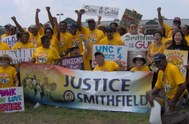Another Vote to Cheer About–This one for Worker Rights

When your job is to help kill and process about 32,000 hogs a day—as workers in Tar Heel, NC, do at the Smithfield Foods plant—there’s not much to cheer about. The work is grim, the pace is blinding, and injury is a constant threat. But as 2009 dawns, many of the approximately 5,000 workers at the world’s biggest pig processing facility are beaming. For them, life on the slaughterhouse floor is about to get a little better.
In mid-December, after more than 14 years of effort, workers voted 2041 to 1879 to unionize through the United Food and Commercial Workers Union, known as UFCW. They had tried twice before—the second time in 1997 when they lost the election by a small margin amid union-busting activities, including threats, intimidation, and violence against workers.
For Oxfam, the December vote was almost as sweet as it was for the workers. In 2006 we gave the UFCW a $25,000 grant to hire a community organizer to help make that vote happen.
My colleague, Lupe, said it best: “This is a great way to end the year.”
He’s long been familiar with Smithfield tactics to keep the union out of Tar Heel—even as workers at 26 other Smithfield-owned facilities around the US were already represented by UFCW.
“Workers at Smithfield have been trying to organize in the face of a brutal and sophisticated anti-union campaign run by the company,” he said. Fears climaxed last year when federal immigration officials swept in and arrested more than 20 workers from Mexico and Guatemala, saying that they were here illegally. According to the New York Times, 1,500 Hispanic workers ultimately left the plant.
Many of those who left were union supporters, said Lupe. But apparently, so were the African-Americans hired to take their places—or they became supporters. The job of the community organizer Oxfam funded was to build support for the union among the black churches in Tar Heel. And Lupe is very clear about why that was so important.
“In the past 20 years, the meat-packing industry has turned from a decent-paying industry with benefits to a dangerous, low-paying one where workers move at almost impossible speeds and injuries are frighteningly frequent,” he said. “The conditions in these plants—Smithfield included—clearly violate the basic human rights of their workers.”